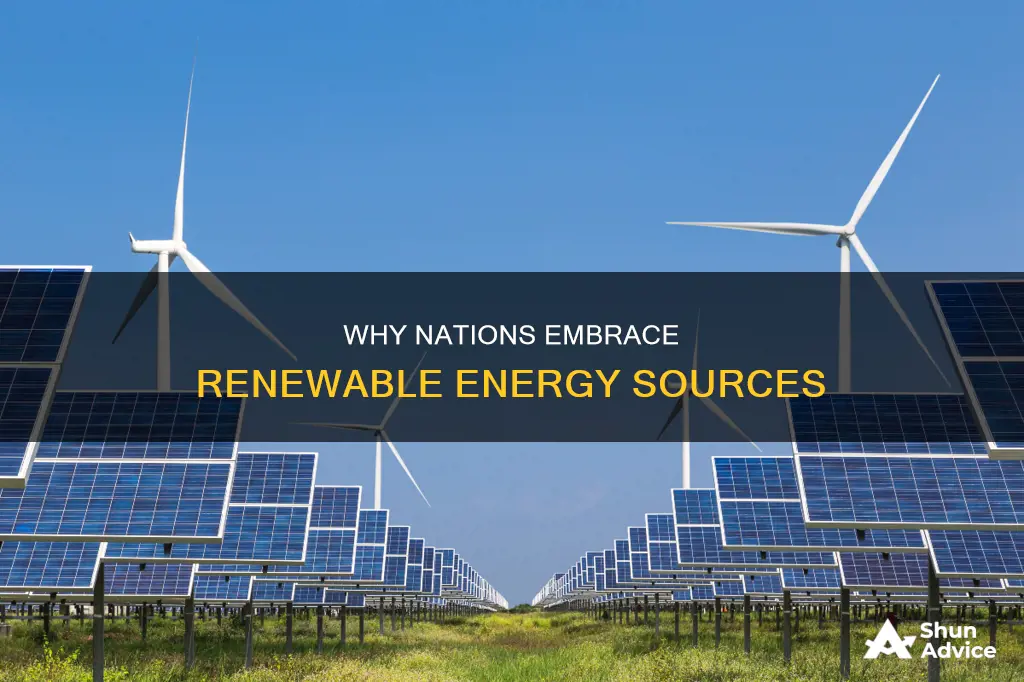
The transition from fossil fuels to renewable energy sources is a critical priority for many countries. Renewable energy sources emit little to no greenhouse gases, are readily available, and are often cheaper than coal, oil, or gas. Global investment in clean energy is accelerating, with $1.7 trillion invested in clean energy technologies in 2022, a 25% increase from 2021. This trend is driven by policies that favour clean energy solutions and the economic competitiveness of solar and wind technologies. The top countries using renewable energy are mostly from Western Europe and have abundant natural resources, such as Iceland's geothermal energy and Norway's hydroelectric power. Many governments are also acknowledging the benefits of increased sustainable energy production, supporting advancements in technology, and introducing policies to reduce carbon emissions.
What You'll Learn

Reducing reliance on fossil fuels
Fossil fuels are the largest contributor to global climate change, accounting for over 75% of global greenhouse gas emissions and nearly 90% of all carbon dioxide emissions. To avoid the worst impacts of climate change, emissions need to be reduced by almost half by 2030 and reach net zero by 2050.
Renewable energy sources such as wind, solar, and hydropower emit little to no greenhouse gases and are readily available. In most cases, they are also cheaper than coal, oil, or gas. About 80% of the global population lives in countries that are net importers of fossil fuels, making them vulnerable to geopolitical shocks and crises. In contrast, renewable energy sources are available in all countries, and their potential is yet to be fully harnessed.
The transition to renewable energy sources will help countries reduce their reliance on imported energy and increase their energy security. This is especially important in times of volatile energy prices and unpredictable geopolitical events.
In 2022, global renewable energy capacity increased by 9.6%, with solar energy alone accounting for about 60% of new installations. This highlights the dominance of solar energy in the renewable sector. The cost of electricity from solar power has also decreased by 85% between 2010 and 2020, making it an attractive investment option for countries looking to reduce their reliance on fossil fuels.
Countries such as Germany, the United States, and China are leading the way in renewable energy investment and deployment. For example, Germany has brought forward its target of achieving 100% renewable energy by 15 years to 2035. The United States has also seen a surge in clean energy investment, with renewable energy sources accounting for about 20% of the country's electricity generation in 2021. China, meanwhile, is prioritizing geothermal, hydrogen, and tidal power as renewable sources of energy, with a goal of reaching peak carbon by 2030 and net-zero emissions by 2060.
By investing in renewable energy, countries can not only reduce their reliance on fossil fuels but also drive economic growth, create new jobs, and protect themselves from unpredictable fossil fuel price swings.
Adding Cash to Your Investment Portfolio: Strategies for Success
You may want to see also

Economic competitiveness
Renewable energy sources are often more economically competitive than fossil fuels. They are cheaper, cleaner, and healthier, and they create more jobs.
Renewable energy sources are now the cheapest power option in most parts of the world. Prices for renewable energy technologies are dropping rapidly. The cost of electricity from solar power fell by 85% between 2010 and 2020, while the costs of onshore and offshore wind energy fell by 56% and 48% respectively. In contrast, fossil fuel prices are rising, making renewable energy sources even more attractive.
The economic competitiveness of renewable energy sources is also driven by policies that favour clean energy solutions. Governments around the world are acknowledging the benefits of increased sustainable energy production, supporting advancements in technology, increasing public awareness, and introducing policies to reduce carbon emissions through energy production.
The economic case for renewable energy is further strengthened by the potential to reduce pollution and climate impacts. The reduction in pollution and climate impacts from renewable energy sources could save the world up to $4.2 trillion per year by 2030.
In addition, renewable energy sources can create a more resilient and secure energy system. They can diversify power supply options and reduce reliance on imported energy, making countries less vulnerable to geopolitical shocks and crises.
Finally, renewable energy sources create more jobs than the fossil fuel industry. Every dollar of investment in renewables creates three times more jobs than in the fossil fuel industry. The transition towards net-zero emissions is expected to lead to an overall increase in energy sector jobs, with an estimated 14 million new jobs in clean energy by 2030.
Tactical Investment Managers: Dynamic Strategies for Market Success
You may want to see also

Energy security
The energy transition from fossil fuels to renewable sources is gaining momentum, with countries recognizing the importance of diversifying their energy portfolios. This shift enhances energy security by reducing dependence on a single source, such as fossil fuels, and mitigating the risks associated with geopolitical tensions and supply disruptions. For instance, Germany, heavily dependent on Russian fossil fuels, is accelerating its transition to renewable energy to phase out Russian oil imports.
Renewable energy sources, such as solar, wind, and hydroelectric power, offer a more secure and sustainable alternative. They are readily available in most countries, reducing the need for energy imports. For instance, countries like Norway and Iceland have abundant natural resources for renewable energy generation, such as hydroelectric power in Norway and geothermal energy in Iceland. By investing in these domestic sources, countries can enhance their energy security and reduce their vulnerability to external shocks.
Additionally, renewable energy technologies are becoming increasingly economically competitive. The cost of electricity from solar power has decreased significantly, making it the cheapest power option in most parts of the world. Wind and solar technologies are also more affordable than ever, with prices dropping due to technological advancements and favorable policies. This economic competitiveness further incentivizes countries to invest in renewable energy as a means to enhance their energy security and reduce their dependence on expensive fossil fuels.
Moreover, the development of renewable energy sources creates new jobs and drives inclusive economic growth. Every dollar invested in renewables creates three times more jobs than in the fossil fuel industry. This not only contributes to energy security but also has positive social and economic impacts, particularly in low- and middle-income countries.
Creating an Investment Bot for Telegram: A Step-by-Step Guide
You may want to see also

Climate change targets
The energy transition is well underway, with renewable energy accounting for 26% of electricity generation worldwide. The cost of new solar and wind projects is often lower than that of existing coal-fired power plants, making renewable energy economically favourable. Soaring natural gas prices and inflation have also contributed to the rising investment climate for renewable energy. As energy prices rise, governments are accelerating their climate change targets and investing more in renewable energy sources.
Several countries have set ambitious targets to increase their renewable energy capacity and reduce greenhouse gas emissions. For example, the United States aims to install 30 GW in offshore wind power by 2030, while China plans to reach its peak carbon emissions by 2030 and achieve net-zero by 2060. Germany has brought forward its target for 100% green power to 2035, with an interim goal of 80% by 2030. Similarly, the United Kingdom has made significant strides, with battery storage projects receiving record subsidies and floating offshore wind projects securing more than half of the ScotWind tender in 2022.
These climate change targets and investments in renewable energy are crucial in addressing the global climate crisis. Fossil fuels are the largest contributor to climate change, accounting for over 75% of global greenhouse gas emissions. To mitigate the worst impacts, emissions must be significantly reduced by 2030 and reach net-zero by 2050. By investing in renewable energy sources, countries can decrease their reliance on fossil fuels, reduce emissions, and contribute to a healthier and more sustainable future.
Lithium Investment Guide for Indians: Getting Started
You may want to see also

Job creation
The transition to renewable energy is expected to create millions of jobs worldwide. Every dollar of investment in renewables creates three times more jobs than in the fossil fuel industry. The International Energy Agency (IEA) estimates that the transition towards net-zero emissions will lead to a net gain of 9 million jobs in the energy sector.
In 2022, energy employment reached nearly 67 million, with more than half employed in clean energy. The IEA also projects that energy-related industries will require an additional 16 million workers, for example, in the manufacturing of electric vehicles and hyper-efficient appliances, or in innovative technologies such as hydrogen. This means that a total of more than 30 million jobs could be created in clean energy, efficiency, and low-emissions technologies by 2030.
In the United States, the shift to clean energy has already led to the creation of more than 310,000 jobs in the sector. The country has seen a nearly 60% surge in clean energy investment since the start of the decade.
Other countries are also experiencing job creation as a result of their investments in renewable energy. For example, Greece's Prime Minister, Kyriakos Mitsotakis, has stated that "the growth of the economy is inextricably tied to making ourselves as energy independent as we can. Greece can be a paradigm of how energy transition and climate action can create jobs and sustainable growth."
The development of renewable energy in New Zealand, without government subsidies, is another success story. The country is currently phasing out offshore oil and gas production and has pledged to cut emissions by 30% below 2005 levels by 2030. This transition is expected to create new jobs in the renewable energy sector.
Managers Accepting Investments: Who's On Board?
You may want to see also







